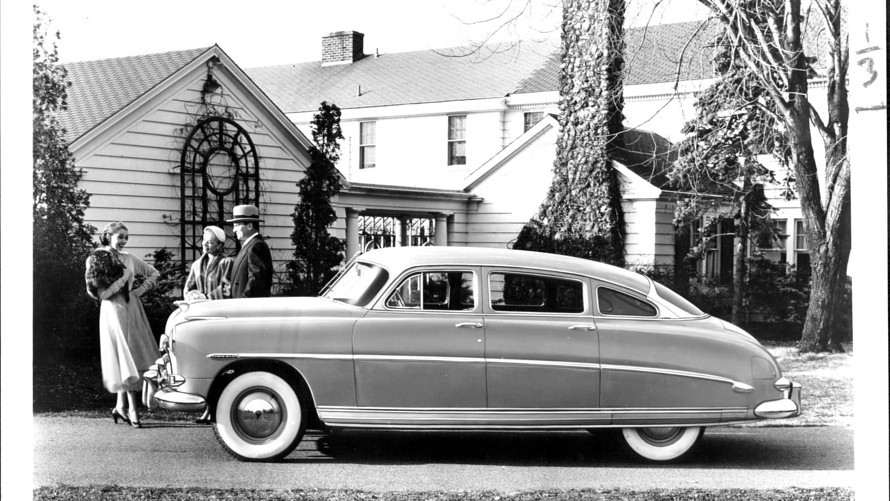That's a lot of speculation there. Besides, FDR didn't start the Depression. The capitalists did that. I would merely look at the results and compare the standard of living between what it was like in America before FDR and after FDR.
Before FDR, this is the world capitalists would have considered idyllic:

And after FDR's policies came to fruition after WW2, this is the legacy he left America:

The interesting thing about it is that, during the Cold War, comparisons between the American system and the Soviet system were common (just as you and I have often talked about). But America during the Cold War was not really a "capitalist" America in the strictest terms. It was the kind of America that capitalists secretly hated and sought to undo in their support of Reagan.
We've covered this extensively in other threads. Reagan's economic policies
were a boon to the economy, but his foreign policy led to later economic downfall.
It was his proxy attack on Iran & supplying Iraq with WMDs which lead to greater
mid-east turmoil, culminating in the devastating wars in started under the Bushes.
The U.S. economy will never have another Golden Age
It was the Golden Age of the U.S. economy, the quarter century between 1948 and 1973, when the U.S. reigned supreme, manufacturing flourished and the American middle class prospered.
During those 25 years, real GDP rose 169%, employment increased by 75% and manufacturing jobs by 30%, while per capita personal income almost doubled.
People of all incomes and education levels could live the American Dream and came to believe that being an American meant your children and grandchildren were almost guaranteed to be better off than you were.
It was, in retrospect, an impossible dream, which ended with the Arab oil embargo and the Great Inflation of the 1970s, followed by the deep recession of the early 1980s.
Still, manufacturing employment kept rising throughout the 1970s, peaking at 19.6 million in June 1979, but inflation was way out of control, and Federal Reserve Chairman Paul Volcker pushed the federal funds rate to an all-time high of 19.1% in June 1981. That crushed inflation but caused the deep recession of 1981-82.
Profits above all else
After that recession, the personal-computer revolution brought advanced analytical tools to office desktops. The academic idea that a corporation’s sole mission was to create shareholder value became a potent weapon in the hands of corporate raiders like T. Boone Pickens and Carl Icahn, who dethroned CEOs of prominent companies.
The bottom line was everything now, foreign competition was fierce, and big U.S. corporations could no longer afford to be private welfare states. They cut benefits and shed jobs to boost earnings and share prices. Steady, well-paying jobs with good benefits became increasingly rare because they were economically unsustainable — and technology enabled employers to outsource work to developing economies like Mexico and China.
The Arab Oil Embargo was noted as a key, pivotal event in causing the US economy to go from boom to bust, although that was part of the larger problem with US foreign policy during the Cold War era. The Cold War also motivated us to help rebuild and prop up the German and Japanese economies, which would later come back to haunt us.
In my view, this points up the key philosophical difference: It was far more important for the capitalists in the US to be anti-communist on a global scale, than it was for them to be pro-American or even pro-freedom or pro-human rights. It didn't matter to us if the Shah of Iran was a murdering despot, just as long as he was anti-communist and US companies could profit. It was the same with Batista in Cuba, Somoza in Nicaragua, and elsewhere throughout the world.
And even the Arab Oil Embargo, after such a blatantly hostile act towards America, we let them get away with it (which the Arabs saw as weakness and became even more brazenly hostile towards us in later decades, up to and including 9/11).
The crash in 2008 was precipitated by 9/11. Instead of deregulation, this crash
was caused & exacerbated by government regulation & control of the lending
industries....decades of Fannie Mae & Freddie Mac making high LTV loans,
which put homeowners underwater. The Community Reinvestment Act led
to lenders doing the same for risky borrowers. This is why Countrywide was
the first to fall.
Then, under Obama, over-regulation of lenders greatly slowed recovery.
Moreover, both Obama & Bush gave bailouts to friends on Wall St, but nary
a dime to homeowners. Both wallowed in crony capitalism.
Well, crony capitalism is a problem, isn't it? This is what leads to greed and high prices. It wasn't that the loans were too high; it's that they needed high loans to feed the greed of capitalist sellers. Price controls would have saved money for buyers and much smaller loans. The issue was that these houses weren't really worth what the capitalists believed they were worth.
This, again, is a philosophical position held by most capitalists - the L'Oreal girl who says "I'm worth it." Despite what the article (linked above) said, it's not that the workers felt entitled to good wages and benefits; it's that capitalist executives felt they were entitled to obscenely high profits.
If they only want single payer health care, they wouldn't clamor for "socialism",
which is defined as government owning the means of production. Nor would
they (as we see even on RF) decry the existence of capitalism.
From what I can see, very few people are actually clamoring for socialism. In fact, it's mostly been the opposite, where capitalists and conservatives called Obama a "socialist" when nothing could be further from the truth. In terms of economic policies, Obama (and Clinton) would be more correctly referred to as "Bush Lite."
